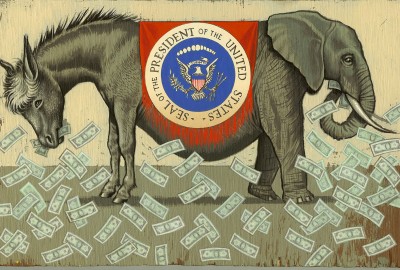Here’s the next in the series from the Dispatches 2015 archive:
If the Republican Party at the national, state, and local level was doing what it was supposed to do, there would be less of a need for the Tea Party or any other organized (or unorganized) group of citizens working the political fields.
It’s an easy guess that few Americans are familiar with the proper structure for a political parties. After a quarter of a century of involvement with party politics — from a stint at GOP HQ in D.C. (310 First Street SE) — to the precincts of Illinois, I can attest that even most people active in politics on the political right do not grasp the role or the duty of the Republican Party. The reason for that is simple: few, if any, have actually seen the party working well.
It doesn’t matter how well other private organizations like the local Rotary Club or VFW or Moose Lodge are organized and run. But for those who’d like to see their government straighten up and fly right, it’s very worthwhile to understand what the local Republican Party is and what it should and can accomplish.
As I’ve mentioned, a good friend sums political parties up as a message and messengers. So one reason for the existence of a political party is to raise a standard — to lay out a set of principles — to convey a message. This is typically accomplished through the party’s platform. When the content of a platform is ignored, voters understandably don’t know the difference between the parties.
That’s certainly the case when it comes to state-level politics in Illinois. For example, Republicans like our newly elected governor support tax increases. Many GOP Illinois General Assembly members vote against school choice and advocate for the expansion of gambling — all three are no no’s in our state party’s platform.
How the party’s principles apply at the local level make a difference as well. For example, there’s no such thing as a Democratic or Republican pot hole. But ideally, Republicans shouldn’t be involved with the Chicago style “hired truck” scandals to fill those pot holes.
Another example is your local bloated, ineffective, and inefficient public schools that are not managed according to Republican Party platform principles. How many voters in your community are aware of wasteful and excessive school spending on things like exorbitant pensions? Few — because of your local GOP’s failure to inform the public.
The textbooks explain that a political party is an assemblage of people with similar ideas organized to win political support of those ideas. The practical application of that of course is registering voters and mobilizing them on election day.
But the work of messaging shouldn’t just take place during election season. In this information age, a revitalized party should be the political infrastructure that helps carry the message all year long. Local party organizations should invite participation, act as a watchdog over all levels of government, and assist candidates that seek to advance the party’s platform.
As of right now, in most places that infrastructure is non-existent or is in need of much repair.
Up next: A working political party.
Image credit: www.globalresearch.ca.

